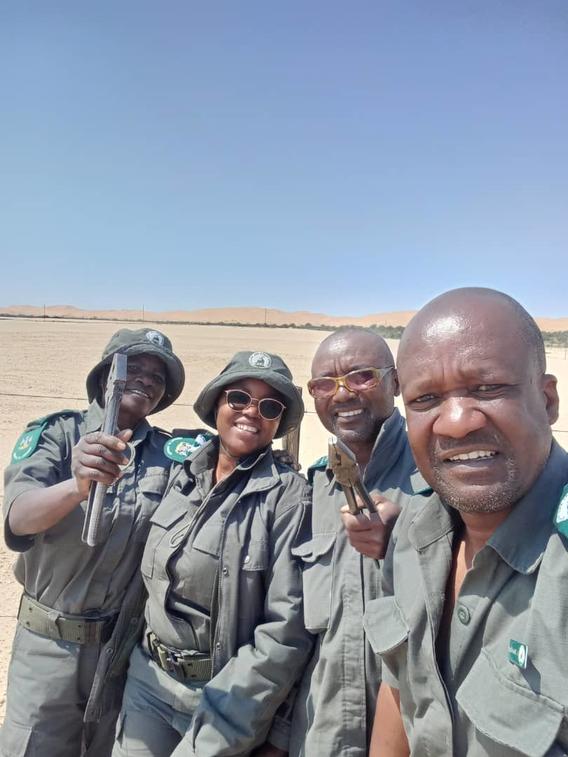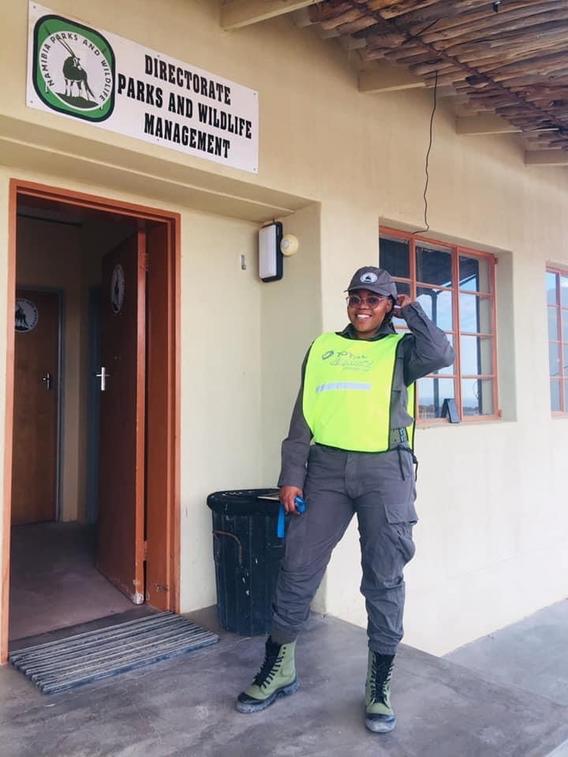The Namib Naukluft National Park is the largest park in Africa and the fourth largest in the world. It also contains the world’s oldest desert—the Namib Desert. Its beautiful landscapes comprise sand dunes that meet the Atlantic Ocean; gravel plains and rivers; and numerous desert-adapted plant and animal species, including the Nara plant, the Welwitchia mirabilis plant (which can live up to 1,500 years), and the Oryx gazelle (Gemsbok)—Namibia’s national animal. Toktokkie beetles, which have unique fog-harvesting techniques, scurry around, while the Peringuey’s desert adder and sidewinding snake move smoothly in the hot sand dunes. And the people who inhabit this unique landscape—the Topnaar people—are some of the oldest inhabitants of Namibia and have learned to thrive in desert conditions.
It’s this rich biodiversity that makes the Namib Naukluft National Park one of the best places that Ester Nanyanga Kayala has ever worked.
Kayala, a 2022 Mandela Washington Fellow from Onamugolo Village in Namibia, is a park warden for the national park, after serving as a park ranger for over two years.

“The environment, and its natural resources, are essential for the survival of life on Earth,” Kayala said. “We cannot survive without clean air to breathe in, plants to eat, water to drink, or shelter to live in and to protect us from adverse weather conditions. Overutilization of natural resources harms the health of the environment and reduces life of both human beings and other animal species. ... We need to act now and help the environment to fight global warming in order to mitigate the impacts of climate change.”
As a park ranger, she fixes park fences, cleans water troughs and provides clean water for wildlife, attends to human-wildlife conflict reports, removes invasive plant species, cleans up park campsites, inspects mines, and supervises other staff.
Kayala also volunteers for the Give Organization, a youth-led organization established in 2019 that has donated food, sanitary products, and school supplies to communities in need in Windhoek, the capital city of Namibia.
This year, the organization pulled off the first phase of their inaugural tree-planting project, planting 30 mango trees at three different schools. The goal of the project is to encourage food sufficiency and mitigate the impact of climate change.
“I am passionate about nature conservation because I would like the future generations to be able to also see free-roaming wild animals such as rhinos or elephants, as well as to get the chance to admire the natural and untouched beautiful landscapes,” she said. “I do not want them to have to question the existence of these animals on Earth like I question the existence of dinosaurs on Earth. The environment is important to me—and to all of us—because it provides us with food, clean air, and water, among other needs. I believe it is of fundamental importance that we use our environmental resources sustainably. We do not have any other to fall on.”
With the help of the Mandela Washington Fellowship program, Kayala hopes to grow within the Ministry of Environment, Forestry, and Tourism in Namibia.

“My current position allows me to sit at the same table with policymakers and contribute toward decision-making concerning environmental management, the conservation of our biodiversity, and our breathtakingly beautiful landscapes.”
She hopes to encourage more youth trained in this career to advocate for sustainable utilization of our natural resources. She wants to lead the fight against poaching and corruption in the future. She was recently selected for the 2022-23 Chevening Scholarship, and she plans to pursue a Master’s of Science degree in Conservation and Biodiversity in the United Kingdom.
“Just knowing that I am doing my job to ensure the survival of plant and animal species that cannot help themselves brings me great joy,” she said.
This year, 24 of Africa’s brightest emerging leaders will participate in an academic and leadership institute at the University of Minnesota through the Mandela Washington Fellowship, part of the Young African Leaders Initiative, which is sponsored by the U.S. Department of State and hosted by the College of Education and Human Development (in the Department of Organizational Leadership, Policy, and Development) in partnership with the Humphrey School of Public Affairs.
